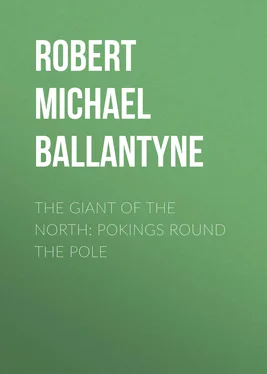Robert Michael Ballantyne - The Giant of the North - Pokings Round the Pole
Здесь есть возможность читать онлайн «Robert Michael Ballantyne - The Giant of the North - Pokings Round the Pole» — ознакомительный отрывок электронной книги совершенно бесплатно, а после прочтения отрывка купить полную версию. В некоторых случаях можно слушать аудио, скачать через торрент в формате fb2 и присутствует краткое содержание. Жанр: Детские приключения, literature_19, foreign_antique, foreign_prose, foreign_children, на английском языке. Описание произведения, (предисловие) а так же отзывы посетителей доступны на портале библиотеки ЛибКат.
- Название:The Giant of the North: Pokings Round the Pole
- Автор:
- Жанр:
- Год:неизвестен
- ISBN:нет данных
- Рейтинг книги:3 / 5. Голосов: 1
-
Избранное:Добавить в избранное
- Отзывы:
-
Ваша оценка:
- 60
- 1
- 2
- 3
- 4
- 5
The Giant of the North: Pokings Round the Pole: краткое содержание, описание и аннотация
Предлагаем к чтению аннотацию, описание, краткое содержание или предисловие (зависит от того, что написал сам автор книги «The Giant of the North: Pokings Round the Pole»). Если вы не нашли необходимую информацию о книге — напишите в комментариях, мы постараемся отыскать её.
The Giant of the North: Pokings Round the Pole — читать онлайн ознакомительный отрывок
Ниже представлен текст книги, разбитый по страницам. Система сохранения места последней прочитанной страницы, позволяет с удобством читать онлайн бесплатно книгу «The Giant of the North: Pokings Round the Pole», без необходимости каждый раз заново искать на чём Вы остановились. Поставьте закладку, и сможете в любой момент перейти на страницу, на которой закончили чтение.
Интервал:
Закладка:
The giant said little about these and other subjects, but thought deeply. His mind, as we have said, was far ahead of his time and condition. Let us listen to some of the disjointed thoughts that perplexed this man.
“Who made me?” he asked in a low tone, when floating alone one day in his kayak, or skin canoe, “whence came I? whither go I? What is this great sea on which I float? that land on which I tread? No sledge, no spear, no kayak, no snow-hut makes itself! Who made all that which I behold?”
Chingatok looked around him, but no audible answer came from Nature. He looked up, but the glorious sun only dazzled his eyes.
“There must be One,” he continued in a lower tone, “who made all things; but who made Him ? No one? It is impossible! The Maker must have ever been. Ever been !” He repeated this once or twice with a look of perplexed gravity.
The northern savage had grasped the grand mystery, and, like all true philosophers savage or civilised who have gone before him, relapsed into silence.
At last he resolved to travel south, until he should arrive at the coasts where these strange sights before described were said to have been seen.
Having made up his mind, Chingatok began his arrangements without delay; persuaded a few families of his tribe to accompany him, and reached the north-western shores of Greenland after a long and trying journey by water and ice.
Here he spent the winter. When spring came, he continued his journey south, and at last began to look out, with sanguine expectation, for the floating islands with wings, and the larger island with the burning mountain on it, about which he had heard.
Of course, on his way south, our giant fell in with some members of the tribes through whom the rumours that puzzled him had been transmitted to the far north; and, as he advanced, these rumours took a more definite, also a more correct, form. In time he came to understand that the floating islands were gigantic kayaks, or canoes, with masts and sails, instead of trees and wings. The burning mountain, however, remained an unmodified mystery, which he was still inclined to disbelieve. But these more correct views did not in the least abate Chingatok’s eager desire to behold, with his own eyes, the strange men from the unknown south.
Eemerk formed one of the party who had volunteered to join Chingatok on this journey. Not that Eemerk was influenced by large-minded views or a thirst for knowledge, but he could not bear the thought that his rival should have all the honour of going forth on a long journey of exploration to the mysterious south, a journey which was sure to be full of adventure, and the successful accomplishment of which would unquestionably raise him very much in the estimation of his tribe.
Eemerk had volunteered to go, not as second in command, but as an independent member of the party—a sort of free-lance. Chingatok did not quite relish having Eemerk for a companion, but, being a good-humoured, easy-going fellow, he made no objection to his going. Eemerk took his wife with him. Chingatok took his mother and little sister; also a young woman named Tekkona, who was his wife’s sister. These were the only females of the exploring party. Chingatok had left his wife behind him, because she was not robust at that time; besides, she was very small—as is usually the case with giants’ wives—and he was remarkably fond of her, and feared to expose her to severe fatigue and danger.
The completed party of explorers numbered twenty souls, with their respective bodies, some of which latter were large, some small, but all strong and healthy. Four of the men were friends of Eemerk, whom he had induced to join because he knew them to be kindred spirits who would support him.
“I go to the ice-cliff to look upon the sea,” said Chingatok one morning, drawing himself up to his full height, and unconsciously brushing some of the lamp-black off the roof of his hut with the hood of his sealskin coat.
At this point it may be well to explain, once for all, that our giant did not speak English, and as it is highly improbable that the reader understands the Eskimo tongue, we will translate as literally as possible—merely remarking that Chingatok’s language, like his mind, was of a superior cast.
“Why goes my son to the ice-cliff?” asked Toolooha in a slightly reproachful tone. “Are not the floes nearer? Can he not look on the great salt lake from the hummocks? The sun has been hot a long time now. The ice-cliffs are dangerous. Their edges split off every day. If my son goes often to them, he will one day come tumbling down upon the floes and be crushed flat, and men will carry him to his mother’s feet like a mass of shapeless blubber.”
It is interesting to note how strong a resemblance there is in sentiment and modes of thought between different members of the human family. This untutored savage, this Polar giant, replied, in the Eskimo tongue, words which may be freely translated—“Never fear, mother, I know how to take care of myself.”
Had he been an Englishman, he could not have expressed himself more naturally. He smiled as he looked down at his stout and genial mother, while she stooped and drew forth a choice morsel of walrus flesh from one of her boots. Eskimo ladies wear enormous sealskin boots the whole length of their legs. The tops of these boots are made extremely wide, for the purpose of stowing away blubber, or babies, or other odd articles that might encumber their hands.
Chingatok seemed the personification of savage dignity as he stood there, leaning on a short walrus spear. Evidently his little mother doted on him. So did Oblooria, a pretty little girl of about sixteen, who was his only sister, and the counterpart of her mother, hairy coat and tail included, only a few sizes smaller.
But Chingatok’s dignity was marred somewhat when he went down on his hands and knees, in order to crawl through the low snow-tunnel which was the only mode of egress from the snow-hut.
Emerging at the outer end of the tunnel, he stood up, drew the hood of his sealskin coat over his head, shouldered his spear, and went off with huge and rapid strides over the frozen billows of the Arctic Sea.
Spring was far advanced at the time of which we write, and the sun shone not only with dazzling brilliancy, but with intense power on the fields of ice which still held the ocean in their cold unyielding embrace. The previous winter had been unusually severe, and the ice showed little or no sign of breaking up, except at a great distance from land, where the heaving of the waves had cracked it up into large fields. These were gradually parting from the main body, and drifting away with surface-currents to southern waters, there to be liquefied and re-united to their parent sea.
The particular part of the Greenland coast to which the giant went in his ramble is marked by tremendous cliffs descending perpendicularly into the water. These, at one part, are divided by a valley tilled with a great glacier, which flows from the mountains of the interior with a steep declivity to the sea, into which it thrusts its tongue, or extreme end. This mighty river of ice completely fills the valley from side to side, being more than two miles in width and many hundred feet thick. It seems as solid and motionless as the rocks that hem it in, nevertheless the markings on the surface resemble the currents and eddies of a stream which has been suddenly frozen in the act of flowing, and if you were to watch it narrowly, day by day, and week by week, you would perceive, by the changed position of objects on its surface, that it does actually advance or flow towards the sea. A further proof of this advance is, that although the tongue is constantly shedding off large icebergs, it is never much decreased in extent, being pushed out continuously by the ice which is behind. In fact, it is this pushing process which causes the end of the tongue to shed its bergs, because, when the point is thrust into deep water and floats, the motion of the sea cracks the floating mass off from that pail which is still aground, and lets it drift away.
Читать дальшеИнтервал:
Закладка:
Похожие книги на «The Giant of the North: Pokings Round the Pole»
Представляем Вашему вниманию похожие книги на «The Giant of the North: Pokings Round the Pole» списком для выбора. Мы отобрали схожую по названию и смыслу литературу в надежде предоставить читателям больше вариантов отыскать новые, интересные, ещё непрочитанные произведения.
Обсуждение, отзывы о книге «The Giant of the North: Pokings Round the Pole» и просто собственные мнения читателей. Оставьте ваши комментарии, напишите, что Вы думаете о произведении, его смысле или главных героях. Укажите что конкретно понравилось, а что нет, и почему Вы так считаете.












